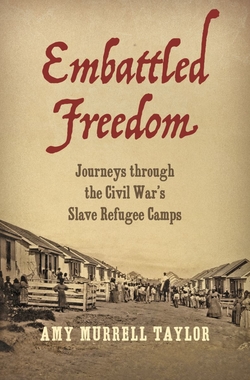
Yale’s Frederick Douglass Book Prize is the most recent award Amy Murrell Taylor has won this year for her 2018 book, which tells the stories of African American slaves seeking refuge during the Civil War.
Taylor, a professor of history at the University of Kentucky, was awarded the prize on Nov. 12 for her book “Embattled Freedom: Journeys Through the Civil War’s Slave Refugee Camps.” The prize has been presented annually since 1999 by the MacMillan Center’s Gilder Lehrman Center for the Study of Slavery, Resistance and Abolition, in partnership with the Gilder Lehrman Institute of American History. Taylor’s book — which will be honored with a $25,000 cash prize at celebration in New York City on Feb. 13 — was selected from a pool of over 70 nominations.
“Reading about 19th century refugees and then coming across news of caged children or immigrants dying in the Mediterranean [Sea] made me realize quite quickly that I was in the presence of a timeless book — one that discussed issues that are not something of the past, but that are very much current and in desperate need of humane solutions,” wrote University of Leeds professor and prize judge Manuel Barcia in an email to the News.
The panel of judges that chooses the Douglass prize’s winner changes every year and is selected by Sterling Professor of History David Blight, director of the Gilder Lehrman Center. In addition to Barcia, the judging panel consisted of Harvard University’s Vincent Brown and University of Connecticut’s Manisha Sinha, who served as the group’s chair.
In an interview with the News, Sinha said that after receiving 72 nominations, the judges divided the books into three reading lists based on their respective areas of expertise. They then met to create a “long list” of books that were potential candidates for the prize, and then created a shortlist of five works, from which each judge chose a finalist.
She said that in early November, the judges met in New York City to present their findings to a larger committee composed of Yale faculty and members of Yale’s Gilder Lehrman Center and the national Gilder Lehrman Institute. The next day, the committee chose a winner. Taylor said she was “absolutely stunned.”
Taylor began writing “Embattled Freedom” while teaching at the State University of New York at Albany. In 2012, she moved to the University of Kentucky, where she finished writing her book. At both universities, she hired a graduate student to assist with research — mainly sifting through census records. Completing the book took just over 10 years from initial research to publication, she wrote in an email to the News.
“Embattled Freedom” is a study of the lived experiences of thousands of African American men, women and children who sought refuge in camps behind Union lines during the Civil War. Michelle Zacks, associate director of the Gilder Lehrman Center, said in an interview with the News that she appreciated the book for its ability to integrate local histories with the larger story of the war, making the story “come alive on an individual basis.” Zacks also praised the book’s readability and accessibility.
“I set out to write a history of the Civil War centered on the experiences of African American people,” Taylor said. “That should not have been a notable thing when I got started, but … the history and memory of the Civil War have long suffered from romanticization and a determined erasure of anything to do with slavery.”
In addition to the Douglass prize, “Embattled Freedom” has been awarded the Society of Civil War Historians’ 2019 Tom Watson Brown Book Award and the 2019 John Nau Book Prize in American Civil War Era History at the John L. Nau III Center for Civil War History at the University of Virginia. It also won the 2019 Avery O. Craven Award and the 2019 Merle Curti Social History Award, both from the Organization of American Historians.
While Taylor’s work continues to receive accolades, she says she is contemplating her next research project, which she says might focus on topics at the intersection of race and migration in American history. While writing “Embattled Freedom,” she said, fellowships from the National Endowment for the Humanities and the American Council of Learned Societies allowed her to take time away from teaching and focus on research. Currently in her seventh year at Kentucky, she’s now eligible for sabbatical.
“I felt especially privileged to have this time and financial support when I stopped to think about how little was available to the people who fled slavery during the Civil War,” Taylor wrote.
Taylor serves on the editorial advisory board for the Civil War Monitor historical magazine, and formerly served on the Journal of Southern History’s board of editors. Along with the University of Georgia’s Stephen Berry, she edits the “UnCivil Wars” series, a short book series which examines unique perspectives on the Civil War. She previously published “The Divided Family in Civil War America” in 2005.
Earlier this year, the University of Kentucky honored Taylor with the Provost’s Award for Outstanding Teaching. She also won the Governor’s Book Award, coordinated by the Kentucky Historical Society and the Kentucky governor’s office.
“Amy Taylor is a phenomenal researcher, but she’s also one of our most outstanding teachers, and departmental citizens, and she’s doing incredible public history work,” University of Kentucky history department chair Karen Petrone said in an interview with the News.
The Gilder Lehrman Center was founded in 1998.
Olivia Tucker | olivia.tucker@yale.edu







